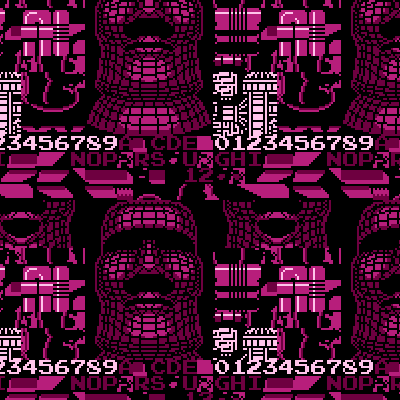
Don Miller aka NO CARRIER is a highly appreciated VJ in the chiptune scene. A small difference to most other VJ’s, his live shows purely consists of self programmed visuals on oldschool computers.
Representing 8bitpeoples from Philadelphia, NO CARRIER can often be seen at festivals and performances around north-east of America. He has nice list of productions on his website, among them some cartridge based NES music albums, a NES based glitch tool and several monthly digital invites for Pulsewave.
The live visuals of NO CARRIER are often very raw and with strong rhythmic computer generated patterns. The mathematical approach on creating the visuals shows in natural ways. Fortunately not by compromising on visual appearance, he manages to keep up with a good sense of consistency.
It’s not a live real-time programmed show, his toolset consists of his self made programs, generating visuals, which can be adjusted on stage by changing parameters to meet the music.
Working together with other visual artists, brings unique combinations of his own mathematical ground layer fed by imagery provided by those artists. He has collaborated with artists like Enso, minusbaby and Alex Mauer in the past, the results are often very surprising.
Here’s some work by NO CARRIER.
glitchNES
An open source NES based glitch tool. Read more about it here.
Live footage of Pulsewave June 2009
With musical performance by IAYD. See part 2 here.
8static live show @ Studio 34
Paris Treantafeles on the vocals & NO CARRIER using Lickshot & Soundbwoy (original NES software) for the music. A visual collaboration with Enso.
Some questions and answers.
 [8bit today] How did you get into programming visuals on 8bit platforms?
[8bit today] How did you get into programming visuals on 8bit platforms?
 [NO CARRIER] I grew up around 8-bit computers and consoles, but mostly the NES. Like many (nerdy) kids, it was my childhood dream to make video games. I use to play the games and try to figure out how they worked, taking careful notice of repeated tiles, colors, and movement patterns. I had crazy theories about it all worked, some of which I now know to be true. Of course as I got older consoles and times changed. I got heavy into PC stuff and the BBS scene, and then found out about the demo scene. I was in awe of a lot of demos) because sceners were doing what I always wanted to do – writing creative software for consoles and computers. I never got into PC stuff, though – because I always liked the 8-bit consoles better. I did play around a lot with emulators and tile editing, hacking around in old NES games and changing their graphics.
[NO CARRIER] I grew up around 8-bit computers and consoles, but mostly the NES. Like many (nerdy) kids, it was my childhood dream to make video games. I use to play the games and try to figure out how they worked, taking careful notice of repeated tiles, colors, and movement patterns. I had crazy theories about it all worked, some of which I now know to be true. Of course as I got older consoles and times changed. I got heavy into PC stuff and the BBS scene, and then found out about the demo scene. I was in awe of a lot of demos) because sceners were doing what I always wanted to do – writing creative software for consoles and computers. I never got into PC stuff, though – because I always liked the 8-bit consoles better. I did play around a lot with emulators and tile editing, hacking around in old NES games and changing their graphics.
Eventually I started going out to chip shows, and getting more into the music of the chip scene stateside. I realized that there were people doing visuals, but not many doing them the way I wanted them done. Many people used high-end computers to do visuals for 8-bit music – and that didn’t seem to fit. I made up my mind to start coding for the NES – my favorite 8-bit console. I had no prior coding experience, so 6502 assembly was pretty intimidating at first. However, I soon fell in love with it because it unlocked all of the secrets I had wondered about for years. It felt good to finally understand the limitations and inner workings of the NES. Even now, I enjoy lower level languages. I enjoy understanding every register and memory location – abstraction is frustrating and confusing to me.
Since then, I’ve been branching out – working on the Commodore 64, TurboGrafx, Atari 2600, and recently the SNES. I haven’t released much for some of those other consoles, and use them less than the NES – but that is because I want to make sure I have some really killer software before I perform with them live. I’m kind of a neurotic perfectionist, and therefore pretty hard on myself.
 [8bit today] Your work is a come together of 2 disciplines, creating visuals by programming, how does it work for you in practice?
[8bit today] Your work is a come together of 2 disciplines, creating visuals by programming, how does it work for you in practice?
 [NO CARRIER] I think being a programmer is the best skill for any live visualist or VJ. I couldn’t imagine using other people’s software for doing visuals anymore. Writing your own software is challenging – but it spoils you. Everything feels so right when I do live performances with my own software. It hasn’t always been that way – I’ve been reworking controls and button settings for years. As I said above, I’m a neurotic perfectionist. Coding my own software lets me get the look and feel I want, while allowing me to control it all easily. I have to say, some of the controllers made for games are better for use in live performance, like the NES Advantage, for instance.
[NO CARRIER] I think being a programmer is the best skill for any live visualist or VJ. I couldn’t imagine using other people’s software for doing visuals anymore. Writing your own software is challenging – but it spoils you. Everything feels so right when I do live performances with my own software. It hasn’t always been that way – I’ve been reworking controls and button settings for years. As I said above, I’m a neurotic perfectionist. Coding my own software lets me get the look and feel I want, while allowing me to control it all easily. I have to say, some of the controllers made for games are better for use in live performance, like the NES Advantage, for instance.
It is also important to be a programmer when dealing with 8-bit consoles and computers. If you are doing visuals on a modern machine, there is a lot of abstraction that takes place – you don’t have to know how movies play or how effects work when you press a button. You can concentrate on the visuals and let someone else’s software do the work. On the other hand, when you are doing visuals on an NES – you better know how everything works if you want to be successful. The more I learn about the machines I use the better the visuals get. It is one of the challenges, but also one of the things I love most about using old hardware.
 [8bit today] One could argue your work, like many more different ‘lofi’ productions, could more easily be done on moderm machinery, offering more creative freedom. What is your motivation to work with the limitations of your choice?
[8bit today] One could argue your work, like many more different ‘lofi’ productions, could more easily be done on moderm machinery, offering more creative freedom. What is your motivation to work with the limitations of your choice?
 [NO CARRIER] Honestly, there are some software limitations, but as far as hardware – give me oldschool gear any day. The first two shows I did were on a high-end laptop – and I was constantly scared of Windows crashing and hitting the wrong button on the keyboard. Compare that to the NES – I’m never worried about it crashing and the controllers feel so natural, especially when you code your software the way you want it to work. I’ve carried 20 year old Commodores and Nintendos to Europe and back with no problem. The expensive laptop I used for my first two shows died a few months ago.
[NO CARRIER] Honestly, there are some software limitations, but as far as hardware – give me oldschool gear any day. The first two shows I did were on a high-end laptop – and I was constantly scared of Windows crashing and hitting the wrong button on the keyboard. Compare that to the NES – I’m never worried about it crashing and the controllers feel so natural, especially when you code your software the way you want it to work. I’ve carried 20 year old Commodores and Nintendos to Europe and back with no problem. The expensive laptop I used for my first two shows died a few months ago.
Also, I’ve often said before that I think my work completes the experience for the concert attendee. I like 8-bit visuals matched with 8-bit music. If you someone on stage with a Game Boy, why should someone be behind the scene doing 8-bit visuals with a laptop? I mean, that may be fine for some people, but I feel strongly about putting on a good show with real 8-bit hardware. I also feel there is an unconscious awareness of the hardware in some people. It isn’t hard to tell the difference between an NES and a laptop. Maybe I’m a purist, or just insane, but I would rather struggle with limitations, because when you break them and come up with something really special – its that much better. My favorite times at gigs are when people come up, look at the gear, and are surprised that the visuals are made by these old machines. Or they ask if the visuals are synced to the music. That is when I know my hard work has paid off and I’ll never go back to using a laptop.
I don’t know how much of my work is directly influence by the demo scene, but I always enjoyed the attitude of sceners. Let’s be honest – there is a certain part of me that feels good about doing what I do with old hardware. Just like the demos that broke records or raised the bar with special effects – I feel that same sense of accomplishment with sticking to 8-bit hardware. There is a certain “street cred” that comes with the territory of using old hardware. If there is a way to be “cool” doing all this, I hope this is it. If not, I’m in trouble.
 [8bit today] What are your ambitions and plans for the future concerning your 8bit work?
[8bit today] What are your ambitions and plans for the future concerning your 8bit work?
 [NO CARRIER] In the last year or so I have been working really hard on releasing open source software. I really want to keep doing that. It feels great to release software that other people can use to make their own 8-bit visual art or music. I feel strongly about the open source aspect of it, partially because I want people to do their own thing, but also because there sometimes isn’t a lot of open source software out there that is geared toward creative use of 8-bit hardware. There is more to old consoles and computers than emulators and gaming.
[NO CARRIER] In the last year or so I have been working really hard on releasing open source software. I really want to keep doing that. It feels great to release software that other people can use to make their own 8-bit visual art or music. I feel strongly about the open source aspect of it, partially because I want people to do their own thing, but also because there sometimes isn’t a lot of open source software out there that is geared toward creative use of 8-bit hardware. There is more to old consoles and computers than emulators and gaming.
As far as my own work is concerned, I want to continue to develop software to use at live performance. I am experimenting with new platforms, but I’ve yet to make a big jump away from the NES. I still enjoy working with it, because there is a lot I haven’t done on it yet. People often speak of limitations in the chip scene, but I feel there is a lot I can still squeeze out of that console. I think most of my recent software is moving more toward abstract patterns and high contrast visuals. In some way, its almost like an 8-bit light show. I’ve also been concentrating on making my software more and more configurable, so I can match any mood or type of music. I kind of had an epiphany last year at Blip Festival (possibly fueled by vodka and Red Bull). It sounds stupid, but since then I’ve been going more abstract in an attempt to really transfer the energy I feel into the software through live performance. Music and video synchronization are more important to me now, because I think an energized, dancing audience can feel the abstract visuals through changes in patterns and color, while keeping their focus on the musicians.
_
Cow’p & NO CARRIER at Blip Festival 2008
Some screenshots of the software he used for his live shows. Click on the images to see the full artwork.
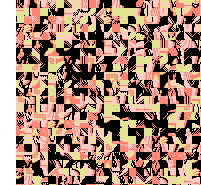 |
 |
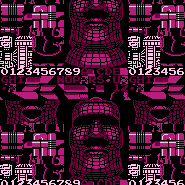 |
 |
 |
|
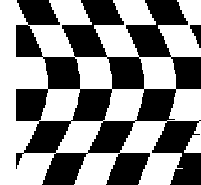 |
 |
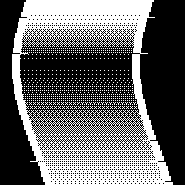 |
 |
 |
 |
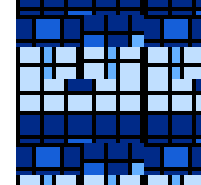 |
 |
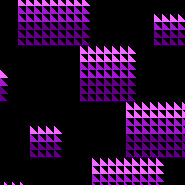 |
 |
 |
 |
![]()
Great interview! Nice to discover new chipartists !
By far one of the best VJs around, as well as a great promoter of chip culture. He’s no doubt the leader and most key player of the Philly chip scene.
Wow, not only are you insanely talented, you have so much integrity, plus so much virtue with open source, old school, and so much eloquence! The world needs people like you.
Love what you do man, always!!
Nice work!!!! hey chec my own version of Crystalis (nes) http://www.youtube.com/watch?v=hxRpjkpvBQM